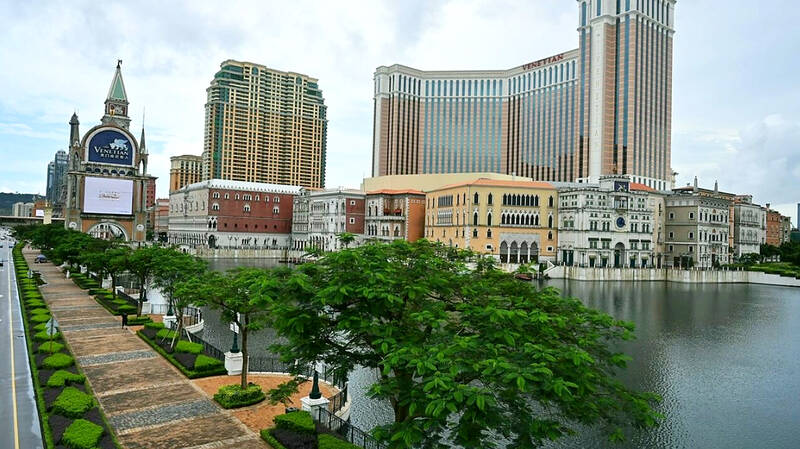Casino stocks soared in Macau yesterday after authorities announced plans to gradually welcome back tour groups from the Chinese mainland, the demographic that makes up the vast majority of punters.
Macanese Chief Executive Ho Iat Seng (賀一誠) on Sunday said Macau would start allowing group tours from mainland provinces, as well as easier e-visa rules for mainlanders, from November.
Gaming stocks surged the most in six months yesterday morning, with a Bloomberg Intelligence gauge of the territory’s six licensed casino operators showing overall gains of more than 10 percent.

Photo: AFP
Sands China Ltd (金沙中國) led the pack, soaring more than 18 percent, SJM Holdings Ltd (澳門博彩控股) rose more than 14 percent while Wynn Macau Ltd (永利澳門) was up 10 percent.
Ho said tour group rules would initially be eased for the neighboring mainland province of Guangdong, followed by other major population centers including Shanghai, as well as Zhejiang, Jiangsu and Fujian provinces.
Daily visitation numbers could rise to 40,000, compared with just 11,000 last month, he added.
However, Macau would not, for now, follow Hong Kong, which last week announced that it was finally scrapping mandatory hotel quarantine for international travelers.
Instead, Macau is to remain largely closed to overseas visitors, maintaining a seven-day hotel quarantine policy.
Even if COVID-19 pandemic measures are fully lifted it is unlikely Macau’s casinos would see a return to their headiest, freewheeling days.
Chinese President Xi Jinping (習近平) has spearheaded an anti-corruption campaign that has seen increased scrutiny of the high-rollers and officials who travel to gamble in Macau, where cases of money laundering are common.
Macau’s six operating concessions are currently up for renewal. Earlier this month all the current operators made bids alongside a seventh newcomer, a company controlled by Malaysian tycoon and Genting Group chairman Lim Kok Thay (林國泰).

WEAKER ACTIVITY: The sharpest deterioration was seen in the electronics and optical components sector, with the production index falling 13.2 points to 44.5 Taiwan’s manufacturing sector last month contracted for a second consecutive month, with the purchasing managers’ index (PMI) slipping to 48, reflecting ongoing caution over trade uncertainties, the Chung-Hua Institution for Economic Research (CIER, 中華經濟研究院) said yesterday. The decline reflects growing caution among companies amid uncertainty surrounding US tariffs, semiconductor duties and automotive import levies, and it is also likely linked to fading front-loading activity, CIER president Lien Hsien-ming (連賢明) said. “Some clients have started shifting orders to Southeast Asian countries where tariff regimes are already clear,” Lien told a news conference. Firms across the supply chain are also lowering stock levels to mitigate

Six Taiwanese companies, including contract chipmaker Taiwan Semiconductor Manufacturing Co (TSMC, 台積電), made the 2025 Fortune Global 500 list of the world’s largest firms by revenue. In a report published by New York-based Fortune magazine on Tuesday, Hon Hai Precision Industry Co (鴻海精密), also known as Foxconn Technology Group (富士康科技集團), ranked highest among Taiwanese firms, placing 28th with revenue of US$213.69 billion. Up 60 spots from last year, TSMC rose to No. 126 with US$90.16 billion in revenue, followed by Quanta Computer Inc (廣達) at 348th, Pegatron Corp (和碩) at 461st, CPC Corp, Taiwan (台灣中油) at 494th and Wistron Corp (緯創) at

NEGOTIATIONS: Semiconductors play an outsized role in Taiwan’s industrial and economic development and are a major driver of the Taiwan-US trade imbalance With US President Donald Trump threatening to impose tariffs on semiconductors, Taiwan is expected to face a significant challenge, as information and communications technology (ICT) products account for more than 70 percent of its exports to the US, Chung-Hua Institution for Economic Research (CIER, 中華經濟研究院) president Lien Hsien-ming (連賢明) said on Friday. Compared with other countries, semiconductors play a disproportionately large role in Taiwan’s industrial and economic development, Lien said. As the sixth-largest contributor to the US trade deficit, Taiwan recorded a US$73.9 billion trade surplus with the US last year — up from US$47.8 billion in 2023 — driven by strong

ASE Technology Holding Co (ASE, 日月光投控), the world’s biggest chip assembly and testing service provider, yesterday said it would boost equipment capital expenditure by up to 16 percent for this year to cope with strong customer demand for artificial intelligence (AI) applications. Aside from AI, a growing demand for semiconductors used in the automotive and industrial sectors is to drive ASE’s capacity next year, the Kaohsiung-based company said. “We do see the disparity between AI and other general sectors, and that pretty much aligns the scenario in the first half of this year,” ASE chief operating officer Tien Wu (吳田玉) told an